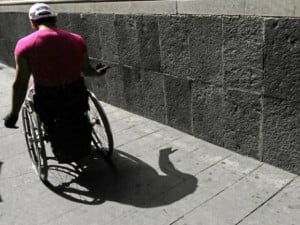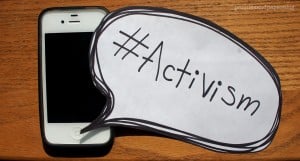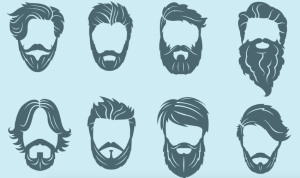
Source: Express Tribune Blogs
Since able-bodied privilege is one of the most unrecognizable forms of privilege in society, today we’re going to talk about ten ways that you can avoid ableism in everyday life.
(As a disclaimer, I can only speak about my experience as a physically disabled person. In no way do I claim to speak for the entirety of the disabled community.)
1. Take the Stairs
If a person with a disability needs to use the elevator, this seems like a no-brainer, right?
Apparently not.
I can’t count the number of times I’ve been waiting for an elevator with a large group of able-bodied people in front of me only to watch them all squeeze on and leave me to wait for the next one.
Obviously there can be exceptions for people with strollers and so on, but for the most part, the vast majority of people who do this are perfectly capable of climbing a flight or two of stairs – or, you know, maybe have the common courtesy not to push past a person with a disability to get first dibs on the elevator.
If you see a person with a disability in line behind you for the elevator, ask yourself, “Am I using this as a necessity or convenience?”
If it’s the latter, climb the stairs or give the person with the disability priority.
2. Don’t Use Handicapped Restrooms
Yet another commonsense rule.
Accessible restrooms are adapted for a reason, not just for the luxury of added space or privacy.
There are usually also at least three regular stalls for every handicapped restroom, so please don’t be the jerk that uses the one bathroom available to the people with mobility impairments.
I have found that this issue makes people very annoyed because it’s a choice that they make unconsciously and will try to come up with a list of circumstances where it’s okay to use the accessible restroom.
Hint: It never is.
Also, I can’t emphasize enough that if you’re an employee of a given venue, that does not give you the “special privilege” of using the handicapped bathroom. It not only makes you look inconsiderate, but reflects badly on your employer as well.
3. Don’t Patronize Us
I could go on about the offensive use of baby talk for hours, but what it boils down to is blanket stereotypes.
Don’t assume someone’s intellectual capacity based on their physical capabilities or lack thereof.
You would never assume that someone with poor grammar or a lisp couldn’t use their body properly, so why on earth does the opposite apply?
When I was younger, I tried to write it off as a function of age, but still at 21, it’s gotten to the point where even people younger than me will speak to me as though I’m five years old.Complete with baby talk and that excessive enthusiasm where everything sounds like a question
Just don’t do this.
It’s embarrassing for everyone involved.
4. Don’t Address Us through an Able-Bodied Person
Related to number three.
Because of my physical impairments, I’m perceived socially as a small child. Sometimes this results in the assumption that I am incapable of processing direct speech.
I have had multiple people on different occasions ask my mom if I am able to speak while I am right next to her and clearly listening.
In addition, it’s important not to equate verbal ability to the presence of comprehension. Plenty of my nonverbal friends communicate and process at the same rates as everyone else.
Once on a field trip in high school, the security guard even asked my friend if she was my mother!
The level of infantilism is ridiculous.
Address us first. We can probably answer whatever question you have much better than a third-party.
5. Don’t Ask ‘What Happened’
People with disabilities are often subjected to a barrage of questions.
Namely, able-bodied people will often assume that our existence represents some kind of mystery that they need to get to the bottom of. This means that people frequently ask us for the truth or origin story of our condition.
Disability is usually (and misguidedly) associated with a moment of trauma, like an accident.
People put on their ethnographer hat and want to find out why you’re different.
It always makes me laugh that people act disappointed when I tell them I was born with cerebral palsy, as if that’s too mundane.
This tendency to interrogate manifests itself most awkwardly in young children.
Please, please, please teach your children that this is inappropriate behavior as early as possible.
I have had to patiently explain why I’m in a wheelchair to far too many children that I don’t know in public while their parents look on affectionately at their child’s inquisitiveness.
Parents seem to interpret it as a welcome social lesson that a person with a disability just happened to come by to underscore the importance of tolerance and accepting difference.
Don’t allow your child to think that they are entitled to demand explanation and justification from everyone who’s different than them.
It’s not our job to educate anyone, children or adults. Everyone has the right to go about their day without being accosted.
6. Make Sure All Venues Are Accessible
And if they’re not not, think about how they can be modified.
It’s always a bummer when you have to constantly change your plans or are just flat-out excluded from an activity because someone forgot to account for accessibility.
This can be anything from visiting friends to attending public events.
Sure, America has the ADA in place hypothetically for businesses and public venues, but the exact definition of accessibility is often loosely enforced.
My friends and I usually invent our own remedies, such as plywood ramps.
For larger events or public spaces like restaurants and hotels, call ahead and make sure they have the proper modifications.
If you can, it’s always best to visit beforehand to avoid any unpleasant surprises.
There’s also always the option of changing your plans to include a more disability-friendly backdrop.
7. Avoid Misguided Comments
“I wish I had a chair!”
We get it. You want to let us know that you think our chairs are cool.
However, statements like the above inadvertently cherry pick the disabled experience and reduce it to the “luxury” of having an easy mode of transportation.
Most of the time, people are very tickled with themselves to announce this jealousy to me.
Able-bodied people think they’re empowering us by flipping the scripts and insisting that they envy us in some way.
It comes off as very grating because they’re oversimplifying disability.
It’s not progressive or cute.
8. Stop Assuming We Want to Be Able-Bodied
Enough of the hypothetical “if you were normal” scenarios.
What is normal anyway?
For example, many people interpret my appreciation for dance as sad because I’m supposedly pining after something that I can’t do.
A lot of people are sports fans, but that doesn’t mean everyone has a secret desire to be a quarterback.
I don’t go around with a tiny violin following me because I can’t do whatever it is you think I need to be able to do to make my life fulfilling.
It’s the same when people ask me if I would “cure myself” if the technology were available.
I happen to be perfectly content with the cards that I’ve been dealt, and if I did want to pursue treatment, it would be for my own reasons and not a result of some starry-eyed assumption that an able-bodied existence would fix all my problems.
The life trajectories of people with disabilities may be a little different, but that doesn’t mean they’re inherently miserable and inferior.
9. Stop Calling Us Inspirational
Ah, my favorite backhanded compliment.
This one might seem to be the most banal.
On a superficial level, it’s a positive thing to be considered inspiring – until you consider the implications.
When you tell someone with a disability or someone who is otherwise perceived as disadvantaged that you find them inspiring, you are essentially saying that you would find their way of life insufferable and wouldn’t be able to cope if the roles were reversed.
While it’s meant to be a compliment to perseverance, it’s not exactly the best way to raise someone’s self-esteem or general outlook.
Yes, people with disabilities often face more challenges, and their accomplishments should be recognized, but don’t condescend us.
Please stop pretending to be humbled by passively perpetuating our oppression in allowing the ableist status quo to persist.
10. Remember: People with Disabilities Are People First
You may have noticed that throughout this article, I made a concerted effort to use the phrase “person with a disability” rather than “disabled person.”
It’s always important to remind yourself of an individual’s personhood instead of the circumstances that define them.
Everyone deserves to be treated with respect.
It sounds cliché, but don’t judge a book by its cover.
—
Superficial circumstances, especially ones as obvious as physical disability, can obscure who a person really is.
Don’t sell yourself short with stereotypes. Get to know us.
Humanity should be shared, not allocated in increments based on privilege or experiences.
A person with a disability could change your perspective on things, but it’s just as likely that you could change ours, too.
Want to discuss this further? Login to our online forum and start a post! If you’re not already registered as a forum user, please register first here.
Erin Tatum is a queer disabled college student currently residing in Berkeley, CA. She is particularly interested in representations of queerness and disability in media. She hopes to advocate for more numerous positive portrayals of marginalized identities in television and film. Follow her on Twitter @erintatum91.
Search our 3000+ articles!
Read our articles about:
Our online racial justice training
Used by hundreds of universities, non-profits, and businesses.
Click to learn more




















